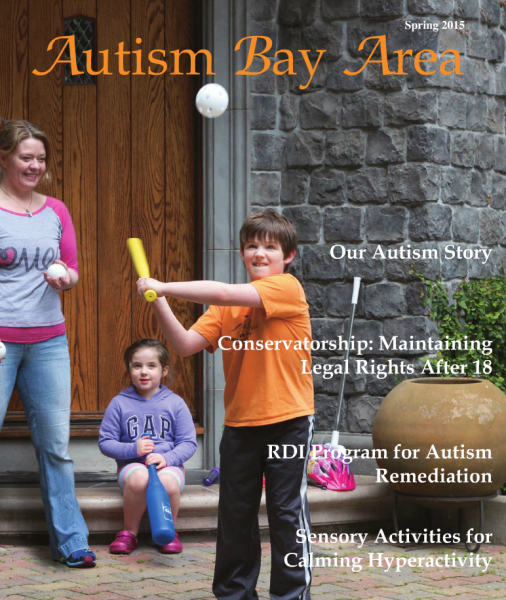Published in Autism Bay Area Magazine (Spring 2015): Sensory Activities for Calming Hyperactive Children
September 29, 2015

As published in Autism Bay Area Magazine (Spring 2015)
- Download and Read Article (PDF)
- View Entire Magazine Online (Autism Bay Area Website)
Parenting or teaching hyperactive children can be frustrating and futile without tools and techniques to help soothe the child who is constantly feeling restless. Hyperactive children are either moving continuously or talking incessantly or both. They have a hard time keeping their bodies still; they seem to be fidgeting and always “on the go.” It is common for them to speak loudly and interrupt others. They can’t sit still in class and have a low frustration tolerance. This inability to self-regulate makes it hard for them to interact socially, impedes their ability to focus, causes anxiety, and often makes it harder for parents and caregivers to help the child.
Hyperactivity can be a symptom of a variety of developmental differences such as, but not limited to, Attention Deficit Hyperactivity Disorder, Childhood Anxiety Disorders, Autistic Spectrum Disorder and Sensory Processing Disorder. Therapeutic activity to help support the hyperactive child may include psychosocial therapy, behavioral modification therapy, cognitive behavioral therapy, psychiatric and sensory integration therapy.
Sensory integration therapy is a successful intervention approach used by skilled clinicians in occupational therapy. The approach helps override the hyperactive brain in a child, allowing them to better adapt to their environment. Sensory integration is how the brain processes and responds to various types of sensory input as a way of organizing different sensations for different tasks. In addition to using our five senses – sight, sound, smell, touch, and taste – we also have a “vestibular” sense and a “proprioceptive “ sense. Our vestibular sense supports our balance and movement. This sense tells us where we are in relation to the ground and things around us. Our proprioceptive sense gives us information about how our bodies are moving in space. This awareness is what helps us control and plan our motor movements. For example, the child who is under sensitive to proprioceptive information may run around banging into objects and people in order to feel their environment and their bodies in space making them appear hyperactive. Sensory integration therapy supports hyperactive children in their ability to learn, play and explore. It works in providing each child with just the right balance of sensory input to help them feel calm and organized in their environments, which in turn makes them feel more successful at school, in their homes and in social interactions.
The top 10 ways to calm a hyperactive child…
- Download and Read Article (PDF)
- View Entire Magazine Online (Autism Bay Area Website)

